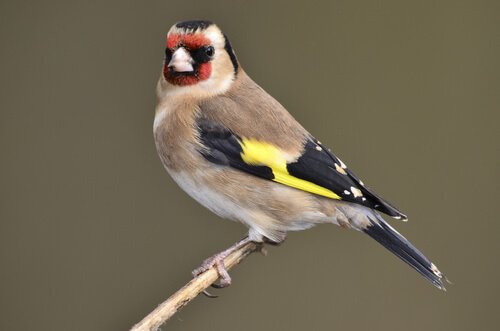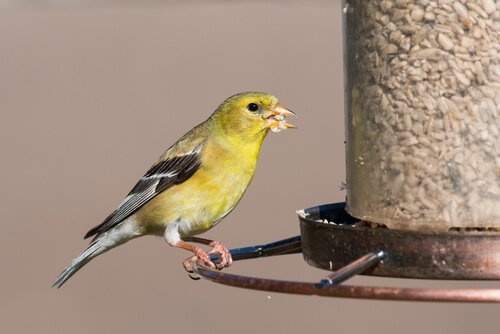Tips for Taking Care of your Goldfinch

The goldfinch, whose scientific name is Carduelis carduelis, is a happy bird that brings joy to any home. Above all, its vivid colors and cheerful tune light up a house. This bird requires special care because has a nervous temperament and sensitive personality.
So, below you can find some tips on the best way to look after pet goldfinch. Your pet will certainly be happy by just following these detailed tips.
The goldfinch’s home
Goldfinches need space in order to fly. It’s a good idea to get a cage of 50 cm in height that has perches for the bird to rest on after flight. This way he can exercise his feet and wings, and he will feel like he has enough freedom to live comfortably.
The cage should be kept in a well-ventilated location, but out of direct sunlight. Choose a spot that’s protected from currents of air or hot vapors. Places such as the kitchen and bathroom are not a good location.
The goldfinch’s cage should be out of reach of dangerous animals like rats or rodents. Likewise, don’t allow you pet goldfinch to have too much contact with wild birds. Although other birds might not hurt him, they may transmit diseases and parasites to your goldfinch.
Proper goldfinch diet
Goldfinches are granivorous, which means their beaks and digestive systems are naturally designed to eat different kinds of seeds. Unlike other granivores, the goldfinch diet must be widely varied in order to meet its nutritional needs. Your goldfinch’s nutritional needs depend on his age, environmental conditions, and current season.
Goldfinches can eat the following: birdseed, poppy, hazelnut, hemp-seed, rapeseed, black and white lettuce, flaxseed, sesame, and perilla. They are able to eat fruits like apricots, plums, figs, strawberries, apples, oranges, pears, bananas, and watermelons, among others.

Fruits and Veggies
The goldfinch can also eat vegetables like tomatoes, lettuce, carrots, broccoli, spinach, and cucumber.
Make sure any fruits and veggies are well-washed before feeding them to your goldfinch. You must make sure they haven’t been in contact with any pesticides or insecticides that might damage the bird’s health. To eliminate the residues, soak the veggies in a mixture of water and sodium bicarbonate for a couple of hours, then rewash them.
Fresh food should be changed multiple times a day. This is the best way to prevent the goldfinch from eating anything that has begun to decompose.
During molting season, the goldfinch might require a complete multivitamin. This supplement should be high in protein to help regenerate feathers. Likewise, you can give your goldfinch wheat germ, soy, or yeast.
There are other specific recommendations depending on the temperature. It’s a good idea to raise his caloric intake with oil-seeds like sunflower seeds or linseed in a cold environment.
Hygiene habits
Tips for caring for your pet goldfinch wouldn’t be complete without advice on hygiene. These will help reduce the risk that your bird contracts infections or diseases.
- Remove feces from the cage daily
- Change the water frequently or place a device that keeps water fresh for long periods of time.
- Blow on the food container daily to clear any remains of empty seeds.
- Avoid letting the bird’s food fall to the floor of the cage so it doesn’t have any contact with feces.
- Deep clean the cage and each perch once a week
With goldfinch’s specifically, you must deworm him as often as your veterinarian suggests. It’s important to choose the right kind of parasite removal and prevention method based on your pet’s age, size, and physical condition. Most pet stores will have powder, spray, and ointment options.
Keep track of the temperature
This is one of the most difficult tips to follow when it comes to caring for a goldfinch. You can’t control the seasonal weather changes. However, you should do everything possible to control the temperature indoors. Abrupt temperature changes affect the immune systems of goldfinches because they make it easier for them to catch a disease. They are especially sensitive to high temperatures.
